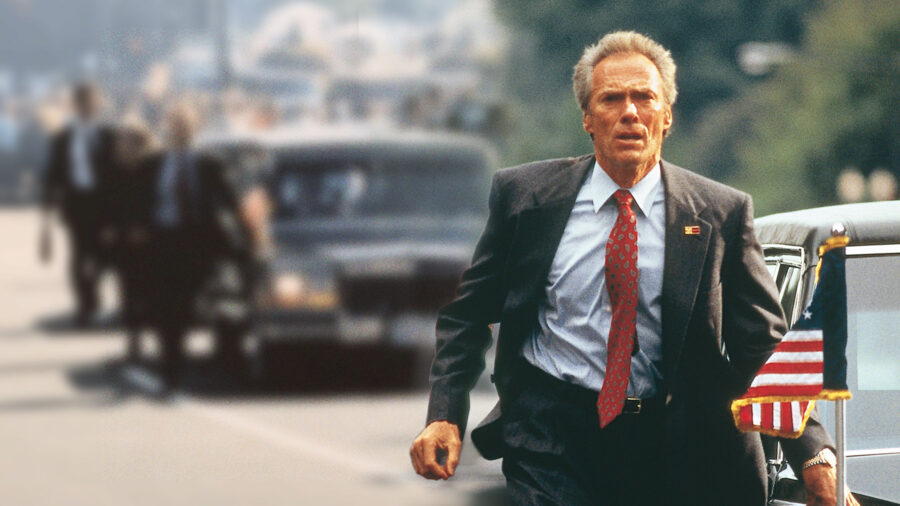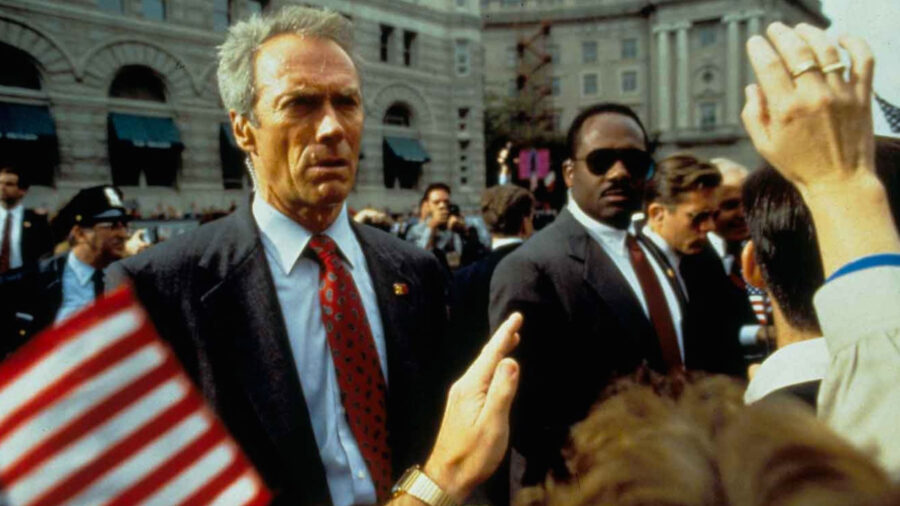The Clint Eastwood Underrated Thriller On Netflix That Will Make You Sweat With Tension

It’s been 30 years since Clint Eastwood’s political action-thriller In the Line of Fire debuted on the silver screen and now, it’s found its way on Netflix, with many fans of Eastwood’s work revisiting the movie while it’s currently on the streaming platform. However, let’s take the time to revisit what actually made this film so great.
In In the Line of Fire, which now stands as a testament to the power of classic action-thrillers, actor Clint Eastwood portrays Secret Service agent Franks Horrigan, a character marked and haunted by past failures. It’s revealed, pretty early in the movie, that Frank is the only remaining agent within the service who was guarding John F. Kennedy on the day the President was assassinated, and he’s wracked with guilt over his failure to react quickly enough and shield the President from the second shot that took his life.
Clint Eastwood’s gravelly voice and stern demeanor really imbue Frank with depth and, paired with Malkovich’s genius performance of the film’s villain, produces a dynamic between the two that’s electrifying.
Now, a new threat arises in the form of Mitch Leary, a psychotic assassin portrayed by John Malkovich, whose cool and methodical demeanor perfectly contrasts his maniacal ambitions—to kill the current President of the US—makes him into a chilling adversary and gives In the Line of Fire more realism; something that modern action-thrillers, with their Michael Bay-esque explosions, obviously lack. But we digress.

Clint Eastwood’s gravelly voice and stern demeanor really imbue Frank with depth and, paired with Malkovich’s genius performance of the film’s villain, produces a dynamic between the two that’s electrifying, which further drives the movie’s suspense to greater heights. The storyline remains pretty straightforward, a cat-and-mouse chase between a disillusioned former CIA operative and an old Secret Service agent driven by a sense of duty, with nothing else to lose.
Clint Eastwood’s portrayal of Frank Horrigan is compelling, and the actor did a fantastic job of portraying the character’s internal struggles and his determination to fulfilling his task—or rather, not failing at it once again.
However, the pacing of In the Line of Fire is generally tight, ensuring that the audience is kept at the edges of their seats.
Clint Eastwood’s portrayal of Frank Horrigan is compelling, and the actor did a fantastic job of portraying the character’s internal struggles and his determination to fulfilling his task—or rather, not failing at it once again. Likewise, John Malkovich’s performance is oddly charismatic, which allowed the actor to craft a memorable and enigmatic villain.
But beneath the surface and the thrilling action, the movie revolves around the same formula all similar movies revolve around—redemption, regret, and the toll that a life in law enforcement can take on an individual.
The technical aspects of the film play well with the actors’ respective characters. Wolfgang Petersen’s direction adds a layer of sophistication to the film; his camera work wonderfully conveys the tension and paranoia that come with protecting the President or any other high-profile figure, as well as the psychological warfare between Clint Eastwood and John Malkovich’s respective characters in In the Line of Fire.

This is particularly true when it comes to close-up shots, as they intensify the emotional impacts during the film’s intense moments.
Despite the film’s massive success among critics, the general consensus reads that some characters could’ve been more fleshed out.
Lastly, In the Line of Fire excels where many modern movies fail, and that conveys a sense of realism, especially when it comes to visuals. This form of cinematography now stands in contrast to modern films, which don’t emphasize the emotional impact and a sense of realism as much, or they do to a smaller extent, in exchange for impossible stunts, larger-than-life explosions, and utterly unrealistic scenarios that sometimes border on science-fiction, rather than action thrillers.
Can anyone imagine Clint Eastwood acting in anything directed by Micheal Bay? Megatron would run back to Cybertron immediately.
All jokes aside, Clint Eastwood’s In the Line of Fire didn’t appeal to everyone. For some viewers, the plot might feel a tad predictable, as it, admittedly, adheres to the familiar patterns of the action thriller genre.
Additionally, despite the film’s massive success among critics, the general consensus reads that some characters could’ve been more fleshed out. But all of them agree on one thing: where most action thrillers focus on stunts and action, In the Line of Fire focuses on the emotional impact and psychological warfare of its main characters.
And lastly, we’d like to mention the numbers, as they usually represent the true success metrics. Clint Eastwood’s In the Line of Fire earned $187,343,874, which is closer to $396,327,586 in 2023 when adjusted for inflation—against a $40 million budget, or around $85 million in today’s money. Those interested in watching In the Line of Fire can do so on Netflix.












